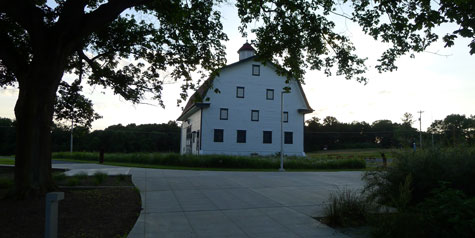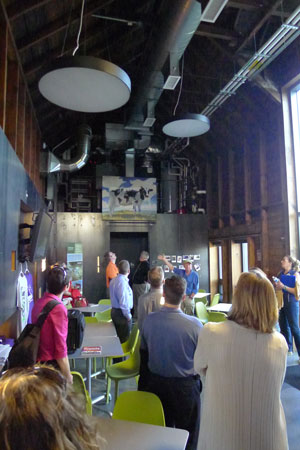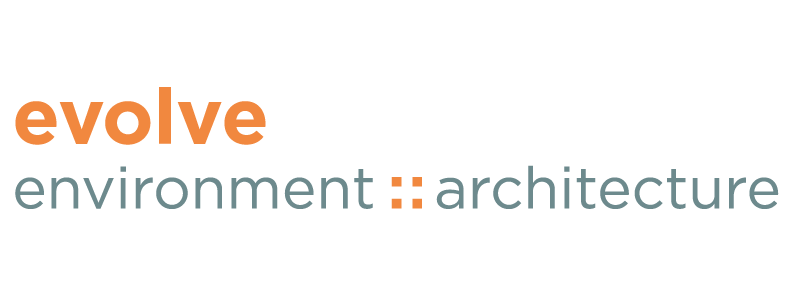Summer Solstice at Eden Hall
The Pittsburgh AIA+2030 sessions continue with a remarkable Session III at Chatham University’s Eden Hall on June 21, the Summer Solstice. The ten sessions of the overall AIA+2030 series, hosted by AIA Pittsburgh’s Committee on the Environment (COTE), inform and engage architects, owners, engineers and contractors to understand, demand, design, deliver, operate and validate highly energy efficient buildings. Session III, focused on site and climate, building upon Session I (integrated design process) and Session II (goal setting). The event was sponsored by Sota Construction, the general contractor for Eden Hall.

Sandy Mendler, AIA, principal architect with Mithun, presented the ambitious concept behind Eden Hall. With a 388 acre parcel deeded to Chatham University a decade ago, the project was master planned by BNIM as a sustainable living and learning laboratory for 22nd century living. Goals such as a net zero site creating more energy than used, treating all sewage on site, growing food and fish on site and achieving LEED Platinum for all buildings, with building EUIs of roughly 20. Sandy mentioned the challenges of achieving a low EUI on the Commons containing an institutional kitchen as an example of staying true to the project goals.
 Peter Walker, Dean of Chatham University’s Falk School of Sustainability, gave a tour of the grounds with walking paths linking the amphitheater, fields, hoop house and effluent treatment facility. Particularly valuable is his perspective in actually operating the facility, linking the vision, design, execution and operation of the campus. Dean Walker shows a sincere desire to understand the processes and cycles of the buildings and site as they relate to the students, people and even animal visitors of the facility. Many puzzles and paradoxes became apparent, such as whether and how to use pesticides, how to use aquaponic water as fertilizer, how to cull deer, whether the site agriculture should pursue organic certification. The deep triple bottom line ramifications of this sustainable campus show how every single decision must be thought through; how all of these decisions are linked together; and how the consequences of all of these decisions are time-bound.
Peter Walker, Dean of Chatham University’s Falk School of Sustainability, gave a tour of the grounds with walking paths linking the amphitheater, fields, hoop house and effluent treatment facility. Particularly valuable is his perspective in actually operating the facility, linking the vision, design, execution and operation of the campus. Dean Walker shows a sincere desire to understand the processes and cycles of the buildings and site as they relate to the students, people and even animal visitors of the facility. Many puzzles and paradoxes became apparent, such as whether and how to use pesticides, how to use aquaponic water as fertilizer, how to cull deer, whether the site agriculture should pursue organic certification. The deep triple bottom line ramifications of this sustainable campus show how every single decision must be thought through; how all of these decisions are linked together; and how the consequences of all of these decisions are time-bound.
Christine Mondor of evolveEA began the program, speaking about site factors and human comfort, borrowing from her work with evolveEA and her Site Factors studio curriculum at Carnegie Mellon University’s School of Architecture. Charles Rosenblum of Carnegie Mellon University spoke about historical precedents in sustainable design philosophy, exploring concepts of craft, materiality and regionalism. Local and organic food from the campus was served.
Marc Mondor, moderator of this session and Chair of COTE, will teach a course dedicated to “Green Building and the LEED Rating System” in the fall term at the Eden Hall campus. With the campus containing so many inherent inquiries, the campus and its long term sustainability goals figure to become a part of the pedagogy as well.
The AIA+2030 sessions will take a break until the fall when they resume with Session IV in September. We are pleased to have had two nationally recognized speakers address the series, with Lance Hosey presenting in Session I.

